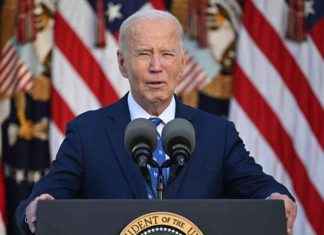For several weeks, Belle Plaine residents have returned daily to the city’s Veterans Memorial Park in protest, demanding that officials restore a cross that had been removed from a military tribute in response to a complaint that it violated the separation of church and state.
City officials are exploring whether they can revive the cross by changing city code to designate a small area around the memorial as a “limited public forum.”
The proposal came from townspeople who want the cross restored to a monument for fallen soldiers, together with the Alliance Defending Freedom, a large Christian legal nonprofit. The proposed public forum would accommodate up to five displays — religious or not — as long as they honor military veterans.
“This is all we were trying to accomplish,” said Joe Burmeister, a groundskeeper with the Belle Plaine Veterans Club who reluctantly cut the cross off the donated monument at the city’s request. “We wanted the memorial put back in its original state — nothing more,” Burmeister said.
The saga began in August when Belle Plaine resident JoAnne Gill filed a police report questioning whether a cross — attached to the silhouette of a kneeling soldier at a comrade’s headstone — erected at the public park was legal. The Freedom From Religion Foundation also objected, arguing that a cross in a public park violates the separation of church and state required by the Constitution.
Belle Plaine residents learned of the city’s decision to remove the cross in early January. It outraged members of the Veterans Club and galvanized residents of the small town 45 miles southwest of Minneapolis. Hundreds of crosses were erected on front lawns and displayed in private businesses to pressure city leaders into reversing the decision.
A rotating guard of citizens occupied the park each day, toting American flags and their own handmade crosses. Many argued that the symbol, in the context of a fallen soldier tribute, was secular rather than religious.
A lawyer representing the pro-cross contingent suggested the creation of a free-speech zone around the memorial, which residents called a fair compromise.
Under the terms of the limited public forum, city leaders would develop a neutral method for approving potential displays, with priority given to veteran’s organizations. If approved by the City Council, the controversial memorial would likely be the first display permanently placed on the property.
Officials would be required to post signs at Veterans Park, just off Hwy. 169, stating that memorials constitute the speech of the owners and not city officials.
“There’s no endorsement of religion,” said Doug Wardlow, an Alliance Defending Freedom attorney representing residents for free. “It’s a proposal that’s going to allow the city to move forward, allow the community to heal, and allow citizens to express themselves in a way that they see fit to memorialize veterans. In that respect, it should be acceptable to all parties.”
The U.S. Supreme Court has issued rulings sanctioning similar forums in the past. But the Madison, Wis.-based Freedom From Religion Foundation has requested that the city reject the public forum proposal on the grounds that it aims to restore a Christian symbol to the park.
“The entire genesis of the policy is religious,” said Rebecca Markert, an attorney with the foundation, who questioned the constitutionality of the proposal. “When you look at a cross, you don’t think veterans, you think Christianity.”
If the council approves the forum, Markert said the group will weigh further legal action and may submit ITS own “Atheists in Foxholes” monument to honor veterans in the town.
Initially, there was talk of simply selling the plot of land to the Veterans Club, but that idea was shot down by club members after they realized that they would not be able to afford regular upkeep and property taxes.
Alliance Defending Freedom, a $40 million Arizona nonprofit involved in Christian religious freedom and “sanctity of life” litigation around the world, is at the center of battles over transgender bathroom policies, marriage equality and contraception. The alliance was part of the Hobby Lobby case that argued successfully before the U.S. Supreme Court that businesses could refuse contraceptive coverage to employees for religious reasons.
Our editors found this article on this site using Google and regenerated it for our readers.







